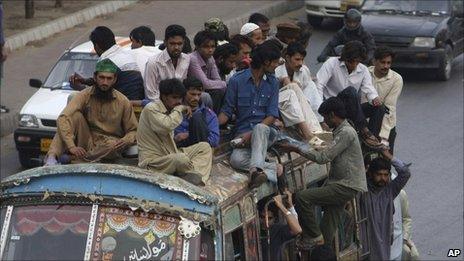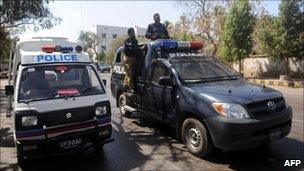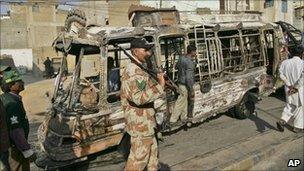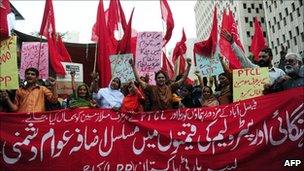Karachi: Pakistan's untold story of violence
- Published

Karachi is increasingly being hit by damaging strikes that disrupt public transport
While attention is normally on the fight against the Taliban in Pakistan's north-west, the rising tide of violence in the southern city of Karachi is Pakistan's untold story. The BBC's Syed Shoaib Hasan examines the brutal spate of targeted killings in the country's commercial capital.
The death toll in Karachi is inexorably rising.
According to human rights organisations, 775 people died in political and sectarian shootings and bomb attacks in Karachi in 2010. Although the government puts the figure lower, at about 500 people, Karachi has become a perilous place.
And although thousands are killed every year in the north-west, the impact of the violence in Karachi is arguably no less important. The city is Pakistan's commercial hub.
Business losses
The disturbances and accompanying city-wide shutdowns and strikes have brought this city of 15 million to a standstill, resulting in heavy losses to business and industrial activity.
This has important implications for the rest of the country, because Karachi has Pakistan's only operational commercial port.
Local traders and business associations say that strikes and violence in 2010 have led to the loss of hundreds of millions of dollars, placing pressure on Pakistan's already beleaguered economy.

Police have sometimes struggled to enforce law and order in one of the world's most crowded cities
Karachi provides 70% of the total annual tax revenue collected by the government.
Yet despite these obvious pressures, Islamabad has not addressed the issue directly.
The spate of killings began to escalate in 2008, largely ignored by the government at the time. But in recent months, this has intensified.
The violence has been largely fuelled by antagonism between the local chapters of three political parties: the Pakistan People's Party (PPP), the mostly Pashtun Awami National Party (ANP) and the Muttahida Quami Movement (MQM).
All three parties are partners in the current ruling coalition that governs Pakistan.
Karachi's political balance
The MQM remains Karachi's dominant political party and represents the city's majority Urdu-speaking community - the descendants of Muslim migrants from India at the time of partition in 1947.
In December 2010, Sindh Home Minister Zulfiqar Mirza accused the MQM of being mainly responsible for the extortion and targeted killings prevalent across the city.
Within 48 hours, an enraged MQM withdrew its support for the PPP-led coalition in Islamabad.
The only reason the government could hold onto power was because opposition parties did not bring a no-confidence motion against the government.
The MQM has since been coaxed back into the coalition and now holds the political balance.
However, tensions remain with the ANP and the PPP.

Commentators worry that Karachi is becoming increasingly dangerous
In Karachi, all three parties have been involved in stoking ethnic passions.
The latter part of the 1980s saw the rise of ethnic and sectarian militants in Karachi. There were ethnic riots, primarily between the Pashtun- and Urdu-speaking communities.
By the 1990s, the situation had become so bad that security forces began operations against what they termed "anti-state and criminal elements".
This was basically a reference to the MQM and its political activists.
Thousands were arrested; many were were later killed in what human rights organisations and the Pakistan media said were staged killings by security forces.
The MQM fought back - and was held responsible for a number of murders of police and security officials
The party said it was targeted by a conservative security establishment for its liberal politics and for fighting for the rights of the Urdu-speaking community.
Pashtun pressure
Things changed under the government of President Pervez Musharraf and the party now enjoys excellent relations with the establishment.
"The MQM's 'new deal' with the establishment is that its control of Karachi will remain unchallenged by the security establishment," a political analyst, who wished to remain unnamed, told the BBC.
"In return, the MQM will support the establishment's policies in the centre."
MQM insiders acknowledge this deal, although they insist the party will never vote for "anything against the spirit of its ideology".
Obviously, this deal stands as long as the MQM controls Karachi.
But since 2006, the party has been increasingly feeling the pressure exerted by the growth of the Pashtun community in the city.

Karachi is home to a bewildering number of political parties and campaigning groups
Arriving here in their thousands, the Pashtun newcomers are in competition for land and jobs with the Urdu-speaking community.
MQM leaders say these new arrivals must not be treated as long-term inhabitants of the city - a call at odds with its identity as a party of migrants.
They say that there is a link between the growth of the Pashtun community and the "Talibanisation" of parts of the city - the Taliban is predominantly made up of Pashtun people.
The MQM say they will resist this at all costs, and this bellicosity has led to violence which has claimed dozens of lives.
Some of it has also involved separate turf battles between Karachi's Baloch community - the original inhabitants of the city - and the MQM.
"It's a complex political and ethnic problem which needs to be handled with extreme care," says a local human rights activist.
"Instead, a free-for-all between heavily armed factions continues to claim innocent lives - as the government plays a game of see no evil, hear no evil," he says.
- Published3 February 2011
- Published3 January 2011
- Published14 January 2011